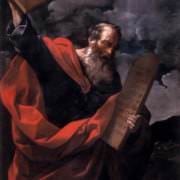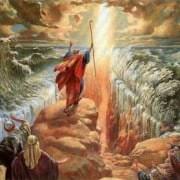Tag Archive for: Moses
The book of Galatians
How Jewish non-Jewish Christians should become is a question that pervades much of the letters in the New Testament. What should a Christian do regarding the Law of Moses? Galatians is a book almost solely devoted to this question. The question naturally leads to others: how is a Christian converted in the first place? How does a Christian live if it’s not directly by the Law of Moses?
On Paul’s second missionary journey in Acts 16 he was delayed in Galatia by a sickness. He kept preaching the gospel of Christ crucified to the largely rural folk in the province of Galatia. Many churches were founded and sprung up as people believed his message. In Paul’s preaching he mentioned nothing of the Jewish Law to the Galatians. Chapter 3 tells us that they experienced great freedom and power as they responded to Paul’s message.
After he left, other teachers came through Galatia. They taught that it was right to observe special days and ceremonies in the Mosaic Law. They said it was because Paul wasn’t a true apostle that he didn’t teach them the right message. The Galatian churches seemed to warm to these false teachers. Paul immediately writes this letter out of great concern for them.
The letter comes to life once you understand this background. Paul greets his friends (1:1-3). He tells them plainly there is only one gospel – and that being the one he told them (1:6-10). Paul next defends his story and testimony of his apostleship. He tells them that Peter and the other apostles agree with his message (1:11-14). Paul reminds them of the gospel he taught and provides proof and argument for it (1:15-4:31). In this passage he explains how a person is saved and what a Christian’s relation to the Jewish Law is now. Chapter 5 and 6 are taken up with Paul explaining how the Christian life is to be lived by the Holy Spirit and doesn’t need ceremony and ritual days to complete it.
His writing is filled with fatherly correction and care. Paul is arguably at his strongest with the Galatians and the false teaching they are considering. He takes his message – Christ’s message – very seriously. He implores them to liberty and freedom in Christ and to freedom from unnecessary Jewish ceremony.
We may read Galatians thinking it’s not all that relevant for us because we are not tempted to bring in Mosaic ritual. Not so. It is very easy to bring in little rules and ceremonies and legalisms that we can easily rely on more than Christ and the Holy Spirit. There is nothing wrong with disciplines and regular behaviours and habits, but we must not trust anything other than Christ and the Holy Spirit for our salvation and godliness. Nothing else, ever. If the Mosaic Law was not enough to bring about righteousness of life, how much less our little rituals and legalisms?
Let Paul’s Galatians correct your compass and set you up for freedom. Not freedom to do as you please, but freedom to be all you were made to be for God.
Pic: Moses With the Tables of the Law RENI (c. 1624)
The book of Exodus
Exodus continues where Genesis ended. We can’t date exactly the beginning of the oppression, but there is from 124 to 274 years between the end of Genesis and the opening of Exodus. Genesis ended with a large extended family flourishing in Egypt. Exodus opens with a nation-sized group living in cruel bondage and oppression in the same Egypt.
Exodus is a very significant book. It is significant on a national level. Jewish people today will still celebrate in March / April the exodus and release of their people. For a follower of Jesus, Exodus has spiritual significance and teaching that forms the bedrock of our understanding about how Jesus came to save us. Exodus tells us how we get released from bondage to worship and live for God. Exodus also contains the dealings of God with one of the greatest leaders in the Bible – Moses. A character study of Moses’ life will teach us endless lessons about God and ourselves.
If you were to ask what is the biggest thing we are to learn and know from Exodus, the answer will probably be that God is The saviour and the king. To look in a little more detail, an easy way to break up the book would be to see three big sections:
-
Israel saved from bondage (1:1-18:27)
-
Israel given the law (19:1-24:18)
-
Israel are commanded to build the tabernacle (25:1-40:38)
Threaded in the narrative is the promise of God. Abraham would be given a people and land. God is true to His word, the number of people is vast, and off they go to get their land.
Some lessons from Exodus
Keeping with the sections above we will focus the lessons in four sections.
1. Meeting you and I through Moses
The first thing that comes to our attention is the amazing way that God ordered Moses’ early life. It reminds us of Acts 17 where God is said to have placed us exactly where we are supposed to be. How many people know that God is organising the good and bad details of their upbringing to make sure they are set up for life with God? Many people blame their past for all their faults. Perhaps. Or perhaps not.
Secondly, Moses needs preparation. Moses is a human. He needs preparation before and while God is using him. So do we. You could say in some ways that every situation we are faced with is in some ways preparation from God. Moses kills a man, hides for 40 years, fails to follows God’s specific directives with Pharaoh, focuses too acutely on his weaknesses, fails to circumcise his kids, and needs constant encouragement from God. And God gives it! God is committed to Moses through everything. And Moses emerges as one of the greatest leaders in the Bible.
We notice Moses’ great love for the people he is with. People are numbers today. Leaders just want fame at expense of followers. Not Moses. He cares about God’s people, not for himself – but for them and for God.
2. Being saved from bondage (1:1-18:27)
Exodus shows us the horror of bondage and the great power needed to escape it. The New Testament says that sin is an inescapable and horrific bondage and serious power is needed for release from it. God has such power. Moses leads Israel in God’s deliverance; Jesus leads us into God’s salvation. If God can deliver those people from an impossible escape, He can lead us out of a life of sin. A fresh trust in God as the deliverer is a message from Exodus.
Think through the things that are plaguing you: thoughts, habits, emotions – those things that never seem to change. What keeps you from trusting and pursuing God with your whole effort to release you from bondage? Who else can release like Exodus shows?
How does salvation in the New Testament relate to the story of the Exodus?
3. Learning to live for God (19:1-24:18)
The pattern of Exodus is in many ways the pattern a Christian follows. We are delivered by a mighty miracle. Next we come into the wilderness with God. Major lessons need to be learned very quickly in life with God. Israel needs to know how to live with God. Every person who seeks to live with God needs to learn to live in a way that makes for close relationship with Him. Israel needs to learn how to live for God. Restful trust, dependence and holiness are the foundations. While God has you in the place where He is teaching you these, rejoice. You’re not where you want to be or where He has promised, but you are not in bondage!
Notice how many times Israel complains in this period. Do a little check on yourself. Have you complained because you failed to see the big picture of preparation?
4. Living with God (25:1-40:38)
These chapters are concerned with the tabernacle. This is a nomadic tent that represents and contains the very presence of God on earth. God was always to dwell with man. From the garden of Eden God dwells with His people. But the tent is restrictive and imperfect. It points to Jesus “who became flesh and tabernacle with us for a time” (John 1:14) and ultimately to, “the dwelling of God is once again with man” in Revelation 21-22.
If we can get much closer to God than Israel in this age of grace, why do you think our experience can be less than fulfilling?
Hebrews tells us that Jesus has been into the heavenly tent on our behalf. What does this mean to you after reading Exodus?
Exodus trickies
The hardening of Pharaoh’s heart.
We are told that God will harden Pharaoh’s heart (4:21). We are also told that Pharaoh hardened his own heart six times. Only after the sixth plague does God ‘harden Pharaoh’s heart’ (9:12). Romans 9:18 tells us “God hardens whom he wills” but Paul insists God is just in v.14. It would seem then that Pharaoh had ample opportunity to soften his heart. He was given five severe plagues to change his heart toward Israel and God. This was Pharaoh’s doing. But when enough was enough, Pharaoh couldn’t soften it anymore and his opportunity had passed; he was hardened and it couldn’t be reversed. God remains just. It is much like a person who will be lost to hell. God will give more than ample opportunity for them to turn to Jesus. In the end God will receive no blame for their hardness, it was theirs alone, God allowed it to remain.
God wanted to kill Moses (Exodus 4:24)
At first it seems a radical turn of events. A closer look shows that Moses needs to learn to be more careful in obeying God. Abraham in Genesis 17 was given circumcision as a covenant sign. Moses obviously thought what God thought important to be otherwise.
The date of the Exodus
Perhaps you didn’t know this but there is considerable debate between two dates – 1446 B.C and 1260 B.C for the exodus. The ESV study Bible on page 33 presents the arguments clearly. You decide.



